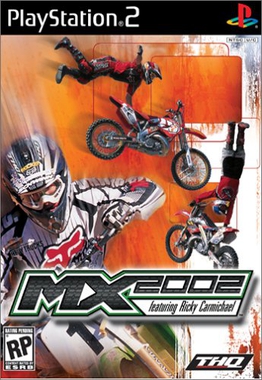
Star Wars Jedi Knight II: Jedi Outcast is a 2002 first- and third-person shooter video game. The Microsoft Windows was developed by Raven Software, the Mac OS X version by Westlake Interactive, and the Xbox and GameCube versions by Vicarious Visions; most versions were published by LucasArts, with only the Mac version published by Aspyr. The game is a sequel to 1997's Star Wars Jedi Knight: Dark Forces II, and the third main installment in the Star Wars: Jedi Knight series. The single-player campaign, set in the fictional Star Wars expanded universe two years after the Mysteries of the Sith expansion for Dark Forces II, follows returning protagonist Kyle Katarn, a mercenary working for the New Republic and former Jedi who cut his connection to the Force. Katarn must return to his Jedi ways to stop a branch of the Imperial Remnant led by the Dark Jedi Desann from empowering their army with the Force.

The Simpsons: Road Rage is a 2001 racing video game based on the animated television series The Simpsons, and is part of a series of games based on the show. It was released for PlayStation 2, Xbox and GameCube. A Game Boy Advance version was released in 2003.

Tom Clancy's Rainbow Six 3: Raven Shield is a 2003 tactical first-person shooter video game developed by Red Storm Entertainment and published by Ubi Soft for Microsoft Windows and Mac OS X. It is the third entry in the Rainbow Six series. The game's plot follows Rainbow, a secret international counterterrorist organization, as they respond to a wave of terrorist attacks threatening South America.

Juiced is a racing video game by British studio Juice Games for Microsoft Windows, PlayStation 2, Xbox, and mobile phones. The game was delayed for release in 2004 because the original publisher, Acclaim Entertainment, went defunct. Juice Games and Fund 4 Games retained ownership of the property and sold the game to THQ, who funded the project for a further six months of improvements. In early 2006, British software publisher Focus Multimedia re-released the PC version of Juiced at a new budget price as part of its "Essential" games series. The game offers different modes including career and arcade that present the player with challenges of increasing difficulty. The player can customise the car to suit their style and unlock new ones in arcade mode. The game features nitrous boosts, similar to that of other racing games. Juiced went to number one in the United Kingdom MCV sales charts and its first version sold 2.5 million units.

Turtle Rock Studios is an American video game developer founded in March 2002 by Mike Booth. It was acquired by Valve in 2008, but was re-founded in 2010 as a subsidiary of Slamfire Inc. by Phil Robb and Chris Ashton. Turtle Rock Studios is involved in the creation of original titles as well as the provision of consulting services to the digital entertainment industry.

Dark Summit is a 2001 snowboarding video game developed by Radical Entertainment and published by THQ. It was released for the GameCube, PlayStation 2 and Xbox,

Sphinx and the Cursed Mummy is a 2003 action-adventure video game developed by Eurocom and published by THQ for GameCube, PlayStation 2, and Xbox. A version for mobile phones was released in 2004. THQ Nordic published a high-definition remaster for personal computer systems in 2017, and Nintendo Switch in 2019.

MX Superfly featuring Ricky Carmichael, released as MX Super Fly in PAL regions, is a motorcross racing game developed by Pacific Coast Power & Light and published by THQ for the Xbox, PlayStation 2, and GameCube. It is the second installment of THQ's MX trilogy and a sequel to MX 2002 featuring Ricky Carmichael, garnering professional motorcross racer Ricky Carmichael's endorsement like its predecessor.

WALL-E is a platform video game developed by Heavy Iron Studios and published by THQ, based on the 2008 film of the same name.

Warhammer 40,000: Space Marine is a third-person shooter hack-n-slash video game developed by Relic Entertainment and published by THQ. The game was released for PlayStation 3, Windows, and Xbox 360 in North America, Australia, and Europe in September 2011. It was released in Japan and published by CyberFront on October 27, 2011.

Darksiders II is an action role-playing hack and slash video game developed by Vigil Games and published by THQ. It is the sequel to Darksiders and was released in August 2012 for Microsoft Windows, PlayStation 3, Xbox 360 and as a launch title for Wii U upon the console's North American and PAL regions release in November of the same year. The story follows the efforts of player character Death to clear the name of his brother, War, who stands accused of wiping out humanity. On a total budget of $50 million, it was one of the most expensive video games to develop of all time.

UFC Personal Trainer: The Ultimate Fitness System is a fighting and fitness video game created by THQ, based on the Ultimate Fighting Championship. The game requires the Kinect accessory for the Xbox 360 version and the PlayStation Move and PlayStation Eye Camera for the PlayStation 3 version. The Wii version does not require any additional accessories to play.

WWE '12 is a professional wrestling video game developed by Yuke's and published by THQ for PlayStation 3, Wii and Xbox 360. It was released on November 22, 2011, in North America, November 25 in Europe, and on January 26, 2012, in Japan. A Europe-exclusive WWE '12 WrestleMania Edition was released on May 25, 2012.

South Park: The Stick of Truth is a 2014 role-playing video game developed by Obsidian Entertainment in collaboration with South Park Digital Studios and published by Ubisoft. Based on the American animated television series South Park, the game follows the New Kid, who has moved to the eponymous town and becomes involved in an epic role-play fantasy war involving humans, wizards, and elves, who are fighting for control of the all-powerful Stick of Truth. Their game quickly escalates out of control, bringing them into conflict with aliens, Nazi zombies, and gnomes, threatening the entire town with destruction.

Homefront: The Revolution is a first-person shooter video game developed by Dambuster Studios. The game was published by Deep Silver for Microsoft Windows, PlayStation 4 and Xbox One in May 2016. It is the reboot/sequel to Homefront. Homefront: The Revolution takes place in 2029 in an alternate timeline, following the protagonist Ethan Brady as he joins a resistance movement against the army of a North Korean occupation in the city of Philadelphia.

Evolve is a first-person shooter video game developed by Turtle Rock Studios and published by 2K. Announced in January 2014, the game was released worldwide for PlayStation 4, Windows, and Xbox One in February 2015. Evolve uses an asymmetrical multiplayer structure, where five players—four playing as hunters and one as the monster—battle against each other on an industrialized alien planet called Shear. The hunters' gameplay is based on the first-person shooter design, while the monsters are controlled from a third-person perspective. The hunters' goal is to eliminate the monster, while the monster's goal is to consume wildlife and evolve to make themselves stronger before either eliminating the hunters, or successfully destroying the objective.

MotoGP: Ultimate Racing Technology, known in the United States as simply MotoGP, is a Grand Prix motorcycle racing video game for Game Boy Advance, Xbox, Microsoft Windows, mobile phones, and N-Gage. It is based on the 2001 Grand Prix motorcycle racing season.

MX 2002 featuring Ricky Carmichael is a video game developed by Pacific Coast Power & Light and published by THQ for the PlayStation 2, Xbox and Game Boy Advance in 2001. It is the third motocross racing game published by THQ to be endorsed by professional motorcross racer Ricky Carmichael, after Championship Motocross featuring Ricky Carmichael and its sequel, Championship Motocross 2001 Featuring Ricky Carmichael, as well as the first game in THQ's MX trilogy, a follow-up series to the Championship Motorcross duology that would eventually become part of its MX vs. ATV crossover racing franchise. A sequel, MX Superfly, was released in 2002 and also endorsed by Carmichael.


















